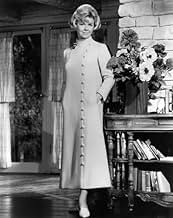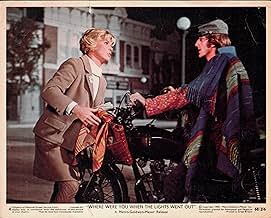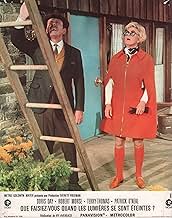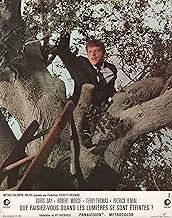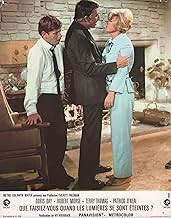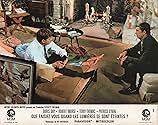¿Qué hacías cuando se fue la luz?
Título original: Where Were You When the Lights Went Out?
CALIFICACIÓN DE IMDb
5.8/10
1 k
TU CALIFICACIÓN
Agrega una trama en tu idiomaDuring a blackout, a New York executive crosses paths with a Broadway actress and her husband.During a blackout, a New York executive crosses paths with a Broadway actress and her husband.During a blackout, a New York executive crosses paths with a Broadway actress and her husband.
- Dirección
- Guionistas
- Elenco
- Premios
- 1 nominación en total
Murray Alper
- Passenger
- (sin créditos)
Hy Averback
- Newscaster
- (sin créditos)
Larry Barton
- Minor Role
- (sin créditos)
- Dirección
- Guionistas
- Todo el elenco y el equipo
- Producción, taquilla y más en IMDbPro
Opiniones destacadas
Stagy adaptation of Claude Magnier's 1956 French play of the same name incorporates the New York City blackout of 1965 into a stagnant roundelay involving an actress, her husband, an agent plus a young embezzler. Dim comedy doesn't even utilize the central calamity for pointed jokes about life in the Big Apple, instead becoming a strained sitcom plunked down in suburbia. Doris Day never lets a bad script get the best of her; even under the most trying of circumstances, the star gives 100% and usually comes out unscathed. Spoofing her own goody-two-shoes image, Doris gets some laughs later in the picture when she's meant to be (comically) sedated; however, Day's male co-stars (Patrick O'Neal, Robert Morse and Terry-Thomas) are not well-suited to her, and neither is the shapeless hairdo she's sporting. For her part, Doris was quick to dismiss the film as "an alleged comedy", noting it was one of several pictures her husband-manager signed her to without her consent. *1/2 from ****
Doris Day has always been fun to watch as she brings her characters to life on the screen. She can play such a broad scheme of emotions, often switching gears in a second. She was particularly delightful as Maggie Garrison, the very happily married wife of Peter Garrison. Then they hit a bump in their relationship--the same night that the the power goes off in New York and the NE part of the country. Maggie retreats to their country home and Peter follows. But this is made more challenging by the loss of power and all the people stranded everywhere. Doris Day is at her funniest when her husband finally does catch up with her and she's so sleepy she can't stay awake. Various coincidences and misunderstandings add up to an amusing and enjoyable film. Also of note is Steve Allen's performance as the Radio Announcer and it was fun to see Pat Paulsen as the Conductor. Both of these characters contributed to the atmosphere during the blackout. It's interesting to note how these New Yorkers in the 1960s handled the power outage, now that we've experienced 9/11.
Although Where Were You When The Lights Went Out is based on a French sex farce I doubt the original play was anything like this film. Especially since there is no French equivalent for Doris Day, no such thing as a virgin, an all French version on their big screen.
I well remember the 1965 blackout on the East Coast, just settling down to dinner with my parents and everything electric went out. But we didn't have half the adventures this cast had.
Doris plays herself essentially, an actress with an All American virgin image locked into a long running play with neurotic director Terry-Thomas at the helm and married to Patrick O'Neal an architect. When the blackout strikes there's no evening performance and Doris returns home to find O'Neal with magazine writer Lola Albright who had been doing a feature interview with them before she left for the theater.
In the meantime a jealous Robert Morse being passed over for promotion by his boss Robert Emhardt's idiot son steals two million in cash, something he had been planning for a while. The blackout puts a real crimp into his getaway plan.
All the principle players manage to wind up at Doris and Pat's Connecticut home and the bedroom comedy begins.
It wasn't the Code that put a damper on this film, it was rather Doris Day and the studio's attempt to remain true to the virginal image that her public expected. This was one of those films toward the end of her career that her husband Marty Melcher put her in to recoup monies he had made bad investments with, her money.
Where Were You When The Lights Went Out has not worn well over the years. Doris was carrying a heavy load here.
I well remember the 1965 blackout on the East Coast, just settling down to dinner with my parents and everything electric went out. But we didn't have half the adventures this cast had.
Doris plays herself essentially, an actress with an All American virgin image locked into a long running play with neurotic director Terry-Thomas at the helm and married to Patrick O'Neal an architect. When the blackout strikes there's no evening performance and Doris returns home to find O'Neal with magazine writer Lola Albright who had been doing a feature interview with them before she left for the theater.
In the meantime a jealous Robert Morse being passed over for promotion by his boss Robert Emhardt's idiot son steals two million in cash, something he had been planning for a while. The blackout puts a real crimp into his getaway plan.
All the principle players manage to wind up at Doris and Pat's Connecticut home and the bedroom comedy begins.
It wasn't the Code that put a damper on this film, it was rather Doris Day and the studio's attempt to remain true to the virginal image that her public expected. This was one of those films toward the end of her career that her husband Marty Melcher put her in to recoup monies he had made bad investments with, her money.
Where Were You When The Lights Went Out has not worn well over the years. Doris was carrying a heavy load here.
On November 9, 1965 much of the eastern seaboard suffered a power outage and this included huge sections of New York City. To that effect, this film involves several fictional characters who had their lives severely impacted by this development. The first character by the name of "Waldo Zane" (Robert Morse) who works as the treasurer for a large corporation and has just stolen $2 million from it. His escape plan, however, didn't factor in a massive blackout and because of that he winds up at a house in Connecticut trying to get transportation to Boston. In the meantime, an actress on Broadway named "Margaret Garrison" (Doris Day) has had her play cancelled due to the electric shortage and upon heading back to her apartment finds her husband "Peter Garrison" (Robert O'Neal) alone with an attractive journalist by the name of "Roberta Lane" (Lola Albright). Furious at his indiscretion she decides to cancel her planned retirement and heads to her house in Connecticut to consider a divorce. Delighted with this new development her manager "Ladislaus Walichek" (Terry-Thomas) immediately gets in his car and also heads to Connecticut in order to get her to sign a new contract before she changes her mind. Meanwhile, Peter--who is desperate to get back in good graces with his wife--decides to drive to Connecticut to beg for her forgiveness. What he isn't prepared for, however, is the turmoil created when all of the characters show up at his house at around the same time. Now rather than reveal any more I will just say that this was an okay film which had a fairly entertaining plot but was diminished somewhat by rather flat performances by everyone involved. It also didn't help to have the character of Peter Garrison being as unlikeable as he was either. In any case, those interested in a standard comedy from this particular time period might find it amusing to a certain extent and I have rated it accordingly. Average.
this movie was next to the very last movie that miss day made....it has been criticized as being a terrible movie....i disagree....this movie has some very funny moments, mostly because of miss day but the cast is not bad.....most of miss day`s movies around this time were being laughed off with doris being wrongfully accused of trying to hold on to her virginity which was groundless because really if they were to examine miss day`s films, she actually was married in most of her films including this movie " where were you when the lights went out?" so really all those tired jokes about her playing a virgin all the time were and are, erroneous...while this movie is not the best movie she ever made, she still gives it her all and it is indeed worth watching and so interesting to see miss day take a movie such as this and milk it into a pleasing comedy, which, is a tribute to her talent and professionalism...have a great day with doris day!!
¿Sabías que…?
- TriviaThere appears to be a rights issue tied up with the issuing of this film. While it was a television staple for many years and was released on videocassette several decades ago, it has not been televised or released in digital format since that time. As of 2018, the film has been out of circulation for nearly 25 years.
- ErroresWhen Margaret is sitting on the couch during her interview, the yellow cushions beside her keep moving.
- Citas
Margaret Garrison: [repeated line]
Margaret Garrison: Hello, Peter, so you're here!
- ConexionesFeatured in Lionpower from MGM (1967)
- Bandas sonorasWhere Were You When The Lights Went Out?
Words by Kelly Gordon
Music by Dave Grusin
Performed by The Lettermen
[Title song played over the opening titles and credits, with a reprise played over the end credits]
Selecciones populares
Inicia sesión para calificar y agrega a la lista de videos para obtener recomendaciones personalizadas
- How long is Where Were You When the Lights Went Out??Con tecnología de Alexa
Detalles
- Fecha de lanzamiento
- País de origen
- Idiomas
- También se conoce como
- Where Were You When the Lights Went Out?
- Locaciones de filmación
- Productora
- Ver más créditos de la compañía en IMDbPro
Taquilla
- Total en EE. UU. y Canadá
- USD 7,988,000
- Tiempo de ejecución1 hora 29 minutos
- Mezcla de sonido
- Relación de aspecto
- 2.35 : 1
Contribuir a esta página
Sugiere una edición o agrega el contenido que falta

Principales brechas de datos
By what name was ¿Qué hacías cuando se fue la luz? (1968) officially released in Canada in English?
Responda
